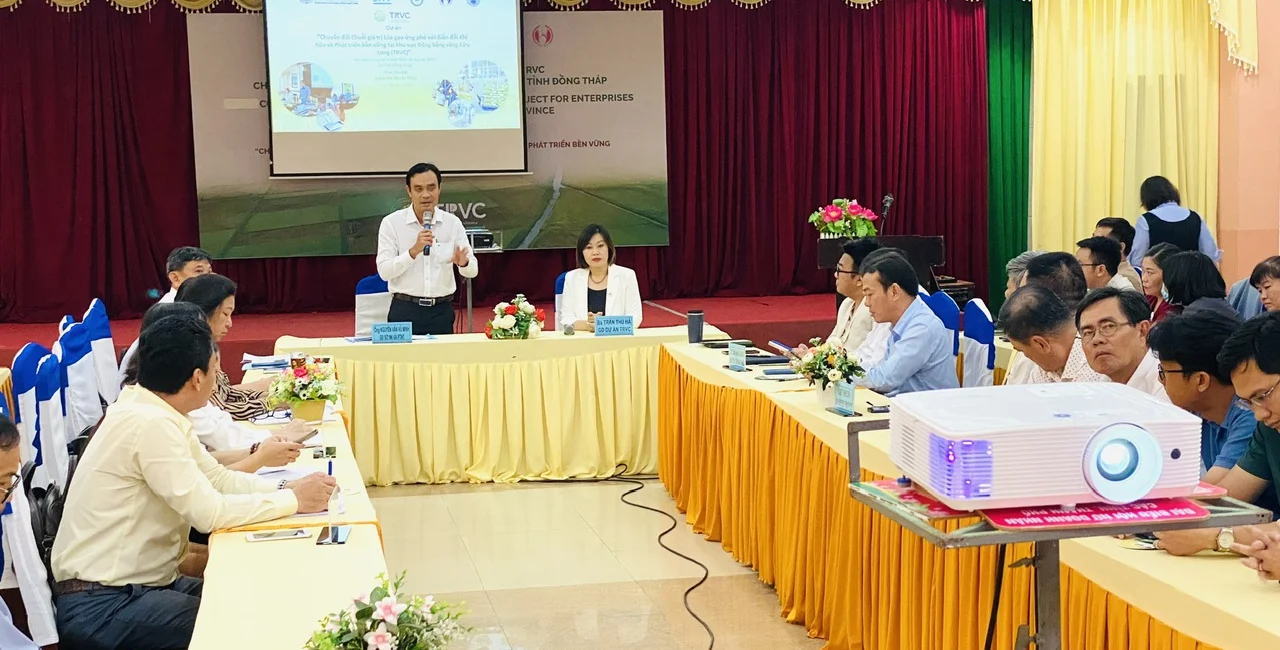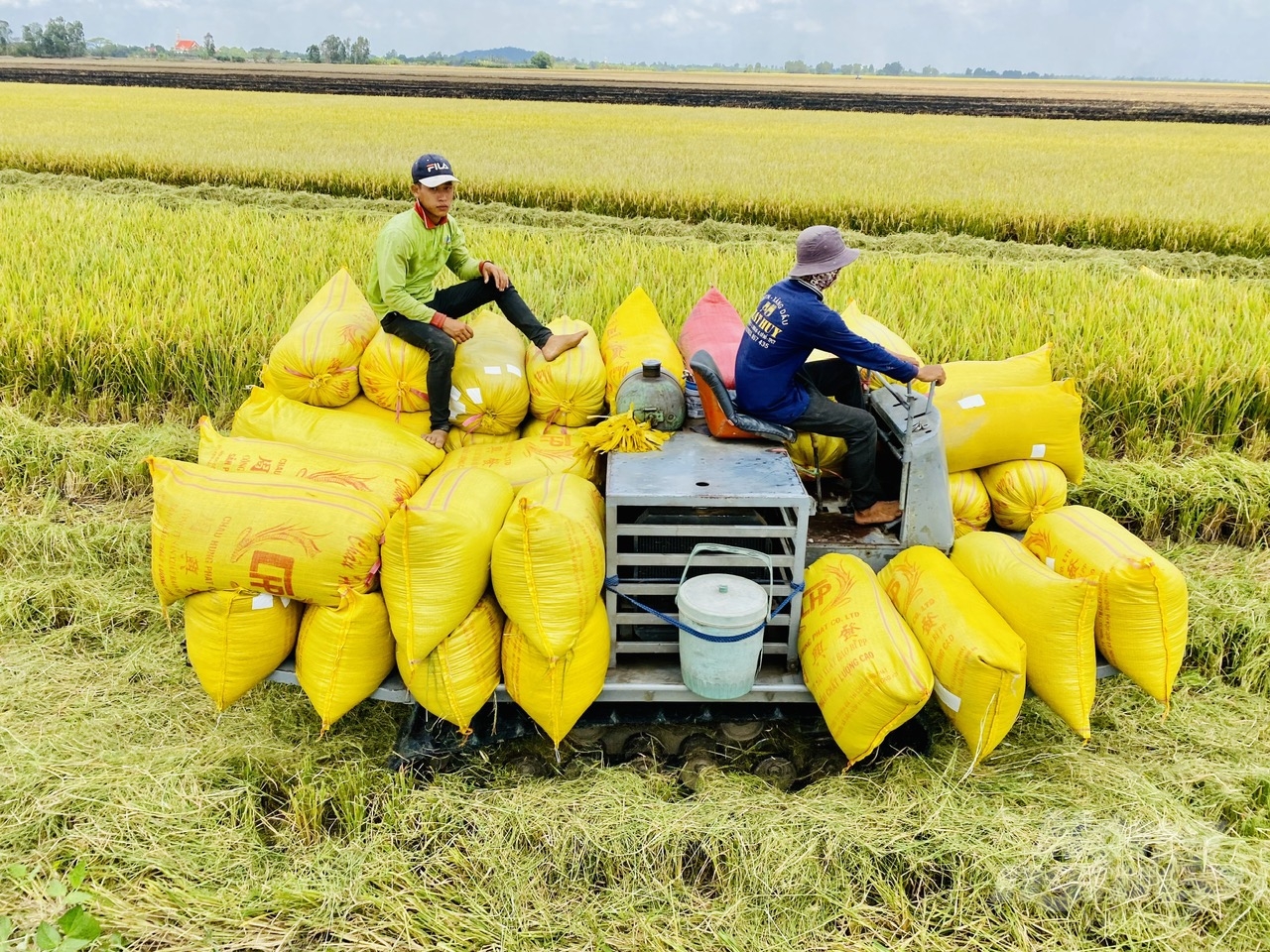November 28, 2025 | 01:45 GMT +7
November 28, 2025 | 01:45 GMT +7
Hotline: 0913.378.918
November 28, 2025 | 01:45 GMT +7
Hotline: 0913.378.918

Mr. Nguyen Van Vu Minh, Director of the Dong Thap Department of Agriculture and Rural Development chaired the announcement press conference on the rice value chain transformation project to respond to climate change and sustainable development in Dong Thap. Photo: Le Hoang Vu.
On September 22, the Dong ThapDepartment of Agriculture and Rural Development coordinated with the Dutch Development Organization (SNV) in Vietnam to hold a press conference to announce the project Transforming the Rice Value Chain to Respond to Climate Change and Sustainable Development in the Mekong Delta region (referred to as the TRVC Project) for businesses in the rice value chain in Dong Thap province. The TRVC project supported Dong Thap with about VND 22 billion to develop the local rice value chain.
Mr. Nguyen Van Vu Minh, Director of the Dong Thap Department of Agriculture and Rural Development, said that rice is one of the five key commodity industries of the province. Dong Thap has a rice growing area of about 494 thousand ha/year, an output of about 3.3 million tons, and the rate of high-quality varieties is nearly 70%.
To concretize the goal of sustainable development until 2030, Dong Thap province has registered with the Ministry of Agriculture and Rural Development to participate in the Project “Sustainable development of 1 million ha of high-quality, low-emission rice cultivation associated with green growth in the Mekong Delta”. The cultivated area of high-quality rice growing areas in the whole province by 2025 will be 70,000 ha, and by 2030 it will be 163,000 ha. Particularly in the winter-spring crop of 2023 - 2024, Dong Thap meets the criteria to participate in the Project with a total area of 40,955 ha.

The TRVC project will support Dong Thap with about VND 22 billion to develop the local rice value chain. Photo: Le Hoang Vu.
According to Mr Minh, on April 28, 2023, Minister of Agriculture and Rural Development Le Minh Hoan issued a Plan to reduce greenhouse gas emissions (including a plan to reduce methane emissions) of the Agriculture and Rural Development sector until 2030, with a vision to 2050. The goal is to ensure a total reduction in greenhouse gas emissions of at least 121.9 million tons of carbon equivalent (CO2eq). Total methane emissions do not exceed 45.9 million tons of CO2eq, increasing carbon sequestration in the forestry and land use sectors. Thereby contributing to the country's commitment to achieving zero emissions by 2050, creating a basis for sustainable development, and improving the added value and competitiveness of the agriculture and rural development sector.
Developing the rice industry to adapt to climate change and reduce emissions is an inevitable trend in the coming time, associated with improving the competitiveness of Vietnamese rice.
Therefore, Dong Thap's agricultural industry is calling for domestic and foreign businesses to participate in the project as the central subjects, determining the success of the project.
Cash and non-cash prizes are incentives for businesses to participate, but the most important thing is to recognize pioneering businesses. The business's products or technologies are tested and certified by international units to reduce greenhouse gas emissions.

Dong Thap calls on businesses to participate in the TRVC Project. Photo: Le Hoang Vu.
Great brand values, rice product lines are produced with environmental responsibility as well and reducing greenhouse gas emissions will lay a solid foundation for businesses ready to participate in the carbon credit exchange market according to Vietnam's roadmap to 2027.
“Dong Thap agricultural industry commits to accompany businesses not only within the project framework but will continue to join hands with businesses to sustainably develop the rice industry, positively contributing to the green growth of Dong Thap province in particular and the entire Mekong Delta region", Mr Nguyen Van Vu Minh, Director of Dong Thap Department of Agriculture and Rural Development affirmed.
According to Ms. Tran Thu Ha, Director of the TRVC Project, using the "pull mechanism" and through the participation of businesses in the rice value chain, the TRVC project will create effective, pioneering catalysts to promote businesses to organize linked raw material areas in a sustainable, multi-value, bringing economic, social and environmental benefits to about 200,000 farming households.
At the same time, it creates a premise for carbon credit certification, ready for transactions when the voluntary carbon credit market is piloted in 2025. Officially operating from 2028 according to Decree 06/2022 of the Government.
Translated by Hoang Duy

(VAN) After the institutional merger, Da Nang possesses significant forest-carbon reserves and is proactively engaging in the carbon market, creating a new revenue stream.

(VAN) An Giang strengthens communication against IUU fishing, increases inspections and sanctions, and is determined to remove the EC’s “yellow card” while developing a sustainable fisheries sector.

(VAN) As green transition becomes a global trajectory, Viet Nam’s biggest challenge is not only technology and models, but how to ensure that capital flows reach the right beneficiaries.

(VAN) The Ministry of Agriculture and Environment must spearhead the construction of green governance, spanning decision-making processes and investment standards to policy evaluation mechanisms.

(VAN) The Agriculture and Environment sector of Khanh Hoa has achieved numerous milestones over the past 80 years, contributing significantly to the goal of establishing the province as a centrally governed city by 2030.

(VAN) Viet Nam is entering the pivotal period of 2025-2030, moving toward the formulation of the Remote Sensing Law, which will establish a legal foundation for the development of national digital data.

(VAN) The agricultural sector is finalizing the strategic framework for emission reduction, setting the goal of sharply cutting methane and 403.7 million tons of CO2 equivalent and moving toward Net Zero by 2050.